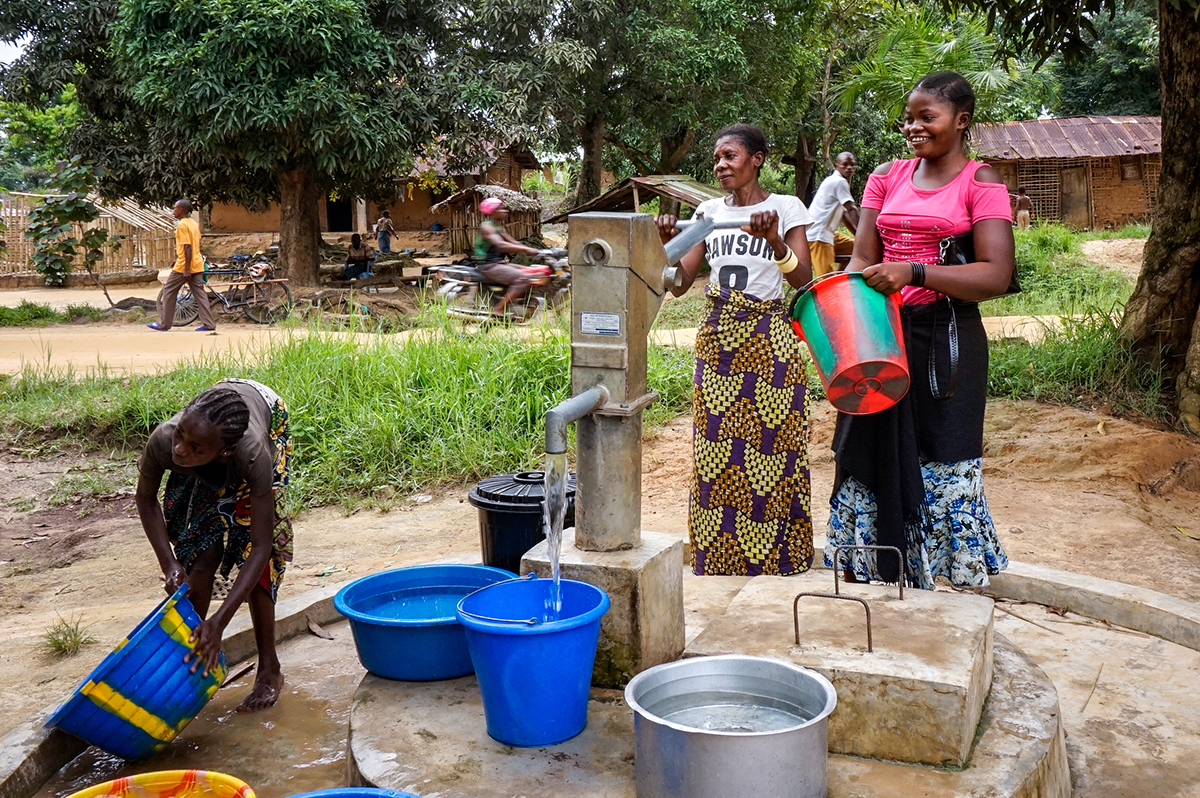
Nadia Kanyere, GPJ DRC
Residents of Lubunga, a municipality in eastern DRC’s Tshopo province, fetch water from a borehole drilled early this year. An estimated 1,500 people use this new water source.
LUBUNGA, DEMOCRATIC REPUBLIC OF CONGO – “My son, Emmanuel Yakanga, died in my arms, and my heart will never heal,” says Sakina Likunde, 50.
On a Thursday afternoon, Likunde’s 10-year-old son had severe diarrhea. By Friday morning, her son had passed away at a local health center in Lubunga, the municipality in eastern DRC’s Tshopo province where she lives.
Limited access to clean water in Lubunga has made outbreaks common for diarrheal diseases such as cholera, Likunde says.
“Having water flowing from a tap would be a miracle,” Likunde says.
Residents rely on water from the Lubunga River, which is 10 kilometers (6 miles) away from the village. Water from the river is used for drinking, cooking, bathing and washing clothes and household items.
Years of using this unsanitary water source, however, have resulted in the spread of infectious diseases, including cholera. But the spread of cholera has been curbed – and local business is improving – thanks to a borehole recently drilled in the center of Lubunga.
More than half of sub-Saharan Africa’s water resources are found in DRC, but an estimated 75 percent of the population remains without access to clean water, according to a 2010 report from the African Ministers’ Council on Water. Due in part to years of conflict, the water infrastructure is damaged or has been slow to develop in some parts of the country.
Limited access to clean water poses a threat to the country’s public health. Diarrheal diseases are among the leading causes of death in DRC – they accounted for nearly 12 percent of deaths in 2012, according to the World Health Organization’s 2015 statistical country profile, the most recent available.
In Lubunga, the most recent cholera outbreak began on December 27, says Dr. Samuel Bosongo, head of the Lubunga administrative health zone. On January 15, when the outbreak ended, 92 people had contracted the disease, six of whom died, he says.
Shortly after the outbreak, residents began drilling a borehole with assistance from provincial government, making Lubunga the most recent beneficiary of the “Village Assaini” program, says Eugene Kikuni, secretary at Regie de Distribution d’Eau de la Republique Democratique du Congo, a government-owned water-distribution company. Through “Village Assaini” which means healthy village, the government, in partnership with UNICEF, constructs boreholes in remote communities to improve accessibility to clean water and improve hygiene and sanitation. So far, the decade-old program has reached 2,850 villages across the country, but officials say boreholes will be constructed in another 6,000 villages.
During a two-month period, 10 engineers supervised the drilling of the borehole, which locals often refer to as “moto pompe” and which goes 17 meters (nearly 56 feet) below ground, says Albert Bita, one of the engineers.
About 1,500 people now have access to clean water, says Roger Solomo, the village chief. Residents use water from the newly created source for household chores, such as cooking. Bosongo says this has contributed to a decline in cholera cases. Of those who contracted cholera during the recent outbreak, only one person still has the disease, and no new cases have occurred, Bosongo says.
Others are using water from the borehole to keep their small businesses running.
Joséphine Linyanya, a small-scale farmer, says that for years she would have to walk to and from the Lubunga River three times each week to fetch water for her crops. But the water was unclean, which sometimes stunted the growth of her crops. But now, she no longer has to trek to the river, and her crops are thriving, she says.
“The availability of borehole water has been our salvation, because we had had quite enough of clean-water shortages,” she says.
But some say residents are still at risk of contracting infectious diseases despite the new water source. Residents should take precautions when consuming water from the borehole, says Junior Bolamba, a health and sanitation expert.
“To me, the construction of the boreholes remains paramount,” he says. “However, people should bear in mind the need to boil borehole water sufficiently to make it safe to drink.”
Ndayaho Sylvestre, GPJ, translated the article from French.






